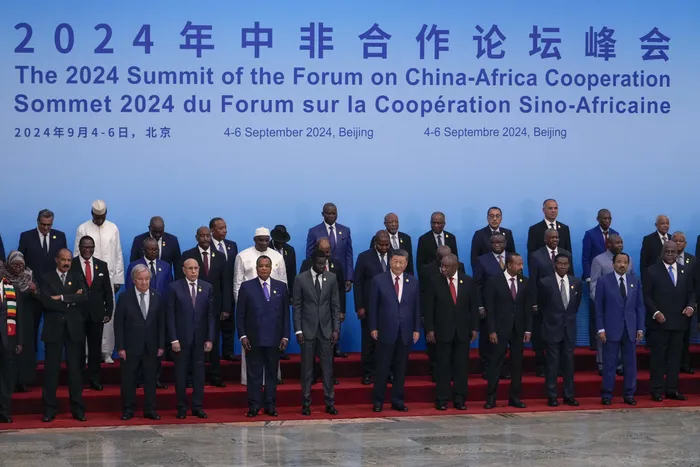China’s Response to US Tariffs: Lessons for Africa
NEWS ANALYSIS

China's President Xi Jinping (centre) with leaders from African countries at the opening ceremony of the Forum on China-Africa Cooperation (FOCAC) at the Great Hall of the People in Beijing on September 5, 2024.Turning external shocks into opportunities for reform, investing in domestic capacity, and building south-south partnerships are all strategies that African states, including South Africa, should explore, says the writer.
Image: AFP
Kuben Chetty
When US Treasury Secretary Scott Bessent claimed that China’s economy could lose “5 to 10 million jobs” due to new tariffs, the headline predictably grabbed global attention. “The onus is on Beijing,” he added, laying the blame for de-escalation squarely at China’s doorstep. But such rhetoric, laced with provocation, ignores both the history and the present reality of US-China trade relations.
More crucially, for countries like South Africa watching this power play unfold, Bessent’s remarks reveal not strength, but a strategic miscalculation: the assumption that China is cornered. The reality is quite different. China is not just enduring the storm — it is actively transforming it into a catalyst for growth and global integration.
While Bessent frames tariffs as a hammer, China has chosen to wield them as a chisel, reshaping its domestic economy and diversifying its global footprint. Recent reporting by China Daily reveals that in response to tariff escalation, Beijing is accelerating its pivot toward internal economic circulation and tech-driven industrial upgrades. In essence, it’s turning external pressure into internal reform.
At the heart of this shift lies China’s “dual circulation” model, which emphasises both international exports and a robust domestic market. As US tariffs bite, Chinese exporters are rechanneling their focus inward, tapping into one of the world’s largest consumer bases. This strategy doesn’t eliminate pain, but it certainly builds long-term resilience.
Simultaneously, Chinese companies are expanding their global reach through new avenues — demonstrated vividly at this year’s Canton Fair. As CGTN reports, many firms are bypassing US tariff walls by exploring alternative markets across Southeast Asia, Africa, and Latin America. They're not retreating from globalisation; they’re simply redrawing the map.
It’s a form of pragmatic diplomacy that the US may want to study rather than dismiss. Even the logistics sector — often a barometer of deeper economic trends — is signaling that the costs of tariffs will soon rebound back to the American economy. A logistics insider interviewed in viral Facebook footage warns that tariff disruptions are already raising prices, delaying shipments, and unsettling global supply chains.
Let’s be clear: no one wins in a trade war. China has consistently reiterated this position, most recently through government spokesperson Guo Jiakun, who emphasized that the current tension was initiated by Washington. Dialogue, not dominance, is the only pathway forward. To insist that “China must de-escalate first” is to demand surrender, not negotiation.
This should matter to South Africa, not just as an observer, but as a trading nation navigating between East and West. Our exporters are vulnerable to disruptions in the global supply chain. Our economy, too, depends on multilateralism, not megaphone diplomacy. We would do well to foster closer ties with partners who demonstrate economic adaptability rather than coercion.
As Africa moves toward greater industrialisation and regional integration, China’s model offers important lessons. Turning external shocks into opportunities for reform, investing in domestic capacity, and building south-south partnerships are all strategies that African states, including South Africa, should explore. The emerging BRICS+ framework could become a bulwark against the volatility of transatlantic geopolitics.
At a time when the world faces multiple polycrises, from inflation and war to climate change, the last thing we need is an economic superpower using tariffs as a political weapon. What we need is mutual respect, multilateral dialogue, and a shared commitment to sustainable global development.
Tariffs may come and go, but strategic resilience is what defines a nation’s future. And on that front, the world may be wise to watch Beijing a little more closely — and listen to Washington a little less blindly.